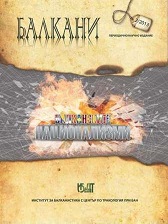Балкани, балканистика, балканска политика
The Balkans, Balkan Studies, Balkan Policies
Author(s): Ekaterina NikovaSubject(s): History
Published by: Институт за балканистика с Център по тракология - Българска академия на науките
Summary/Abstract: A decade after the end of the Yugoslav wars it is worth looking critically into the huge body of literature provoked and inspired by the shocking events. In its best examples, the new discourse on the Balkans rejected categorically the predominantly complacent and superficial stereotyping of the region. Enriched and sophisticated, Balkan studies were incorporated into the main stream of modern humanities. Yet at the same time, this boom was not matched by a boom of the ‘classical’, positivist Balkan balkanistika of Nicolae Iorga and the enthusiasts of the 1960s-1970s, which retreated, giving way to the now fashionable postmodernist, literary and cultural studies. Furthermore, there has been a tendency to use this stigmatizing balkanistic discourse as the only key to explaining the complicated reality of the Balkans and particularly the West’s policies. As a matter of fact, the dynamics and direction of the events in ‘non-Yugoslav Balkans’ went against the logic of balkanism: instead of ‘ghettoization and marginalization’, slowly and gradually they were being integrated into Europe.
Journal: БАЛКАНИ
- Issue Year: 2/2013
- Issue No: 2
- Page Range: 94-105
- Page Count: 12
- Language: Bulgarian

